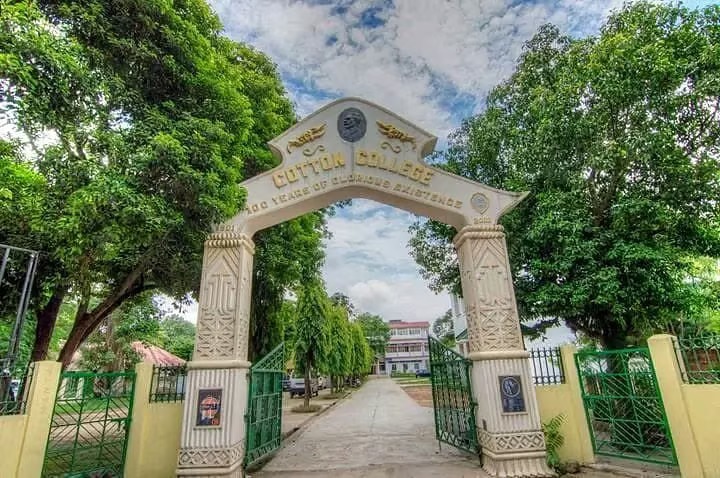In the heart of Guwahati, nestled between the Brahmaputra River and the majestic Nilachal Hills, stands an institution that has been synonymous with the intellectual awakening and socio-cultural development of Assam and the entire Northeast India—Cotton College. As it celebrates its 125th anniversary in 2025, Cotton College is not just commemorating a milestone, but honoring a remarkable legacy that has shaped generations of thinkers, leaders, and changemakers.
A Vision Realized: The Founding of Cotton College :
The story of Cotton College began on 27 May 1901, during the British colonial era, under the visionary leadership of Sir Henry John Stedman Cotton, the then Chief Commissioner of Assam. Recognizing the pressing need for higher education in the region, Sir Henry Cotton pushed for the establishment of an institution that would cater to the academic aspirations of Assamese youth, who otherwise had to travel to Calcutta for higher studies.
With just 39 students and five teachers, the college opened its doors as an affiliate of Calcutta University. It marked a watershed moment in the educational history of Assam, becoming the first institution of its kind in the region to offer undergraduate courses in the arts and sciences.
Early Struggles and Evolution:
Cotton College was born at a time of social and economic backwardness in Assam. Infrastructure was limited, and the college functioned out of a few modest buildings. However, the commitment of its faculty and the enthusiasm of its students propelled the institution forward. Over the decades, the college gradually expanded its academic offerings and infrastructure, becoming a center for intellectual ferment.
By the 1920s and 1930s, it had already begun to attract some of the brightest minds from across the Northeast. The college not only provided education but also became a breeding ground for political and cultural consciousness. It produced leaders who played pivotal roles in the Indian freedom movement and in the socio-political evolution of Assam.
Post-Independence Expansion and Academic Excellence:
After India gained independence in 1947, Cotton College entered a new phase of growth. The post-independence era brought a renewed focus on education as a tool for nation-building. Cotton College responded by upgrading its curriculum, expanding its faculties, and introducing postgraduate courses. It became affiliated with Gauhati University in 1948, helping the latter in its early years of academic and administrative development.
The introduction of postgraduate courses in physics, chemistry, botany, zoology, and English during the 1950s and 60s was a significant step in enhancing academic rigor. Over time, Cotton College built an impressive reputation in science education, with several alumni going on to prestigious institutions like the Indian Institutes of Technology (IITs), Indian Statistical Institute (ISI), and Indian Institute of Science (IISc).
Beacon of the Assamese Renaissance:
Cotton College was more than just an academic institution—it was the epicenter of the Assamese Renaissance. During the 20th century, it played a central role in nurturing Assamese literature, language, music, and theatre. The college saw the emergence of iconic literary figures like Dr. Bhupen Hazarika, Jyotiprasad Agarwala, and Lakshminath Bezbaroa, who either studied or taught here, or were closely associated with the institution.
The campus became a crucible for artistic expression and cultural assertion. Students staged plays, wrote poetry, and engaged in spirited debates on the future of Assamese identity. Cotton College thus helped shape the region’s cultural consciousness.
The Transition to Cotton University:
A major transformation came in 2017 when Cotton College was upgraded to Cotton University by an Act of the Assam Legislative Assembly. This move aimed to give the institution greater autonomy and resources to compete on a national and global scale. The transition was not without its challenges, as alumni and faculty were divided over the loss of the iconic “Cotton College” brand. However, the creation of Cotton University was ultimately seen as a step towards modernizing the institution and aligning it with contemporary educational standards.
The university retained its historic campus and inherited the academic legacy of the college, ensuring that the spirit of Cotton lived on. Today, it offers undergraduate, postgraduate, and doctoral programs across disciplines, serving over 7,000 students.
Celebrating 125 Years: Commemorating the Past,Envisioning the Future:
The 125th anniversary of Cotton College in 2025 is being celebrated with grandeur. The celebrations include academic seminars, cultural festivals, alumni reunions, and the release of commemorative publications. The event is not just about nostalgia but also a forward-looking exercise.
The theme for the quasquicentennial celebrations is “Legacy and Leadership”, emphasizing how the institution must continue to lead from the front in shaping future generations. Plans have been announced to set up a Centre for Northeast Studies, digitize the historical archives of the college, and establish international academic collaborations.
Alumni: Torchbearers of Excellence:
Cotton College boasts an illustrious list of alumni who have distinguished themselves in various walks of life—academia, politics, science, literature, journalism, and public service. Among them are:
Dr. Bhupen Hazarika: The legendary musician and cultural icon.
Hem Barua: Parliamentarian and poet.
Dr. Anil Kumar Goswami: Former Director General of Police and scientist.
Indira Goswami (Mamoni Raisom Goswami): Jnanpith Award-winning author.
Dr. Nagen Saikia: Eminent litterateur and Rajya Sabha MP.
These individuals exemplify the spirit of excellence and service that Cotton College has always stood for.
Scientific Research and Innovation:
While the college began as a liberal arts institution, it has over time emerged as a significant hub for scientific research and innovation. Departments like Physics, Chemistry, Botany, and Zoology have been consistently engaged in research, with several scholars publishing in reputed national and international journals.
The university is now focusing on interdisciplinary research, and its collaborations with scientific institutions such as the North East Institute of Science and Technology (NEIST) and Tezpur University are noteworthy. There is a strong push towards promoting STEM education, sustainable development, and digital literacy in alignment with national education goals.
Challenges and the Road Ahead:
Despite its glorious past, Cotton University faces a range of contemporary challenges—rising student numbers, infrastructure strain, the need for more funding, and global competition. There is also a need to upgrade laboratories, increase digital access, and attract international faculty and students.
To remain relevant and impactful, Cotton University must innovate while retaining its core values. Efforts are underway to integrate National Education Policy (NEP) 2020 guidelines, promote skill-based education, and boost campus placements.
The university is also committed to preserving its heritage architecture, including iconic buildings like the Main Building, the Administrative Block, and Hostels like Swahid Ranjit and Swahid Kanaklata, which are historical landmarks in themselves.
Cotton and Assam’s Political Landscape:
Cotton College has always been intertwined with Assam’s socio-political fabric. During the Assam Movement (1979–1985), the college became a nerve center of protests and activism. Students of Cotton led from the front in voicing concerns about illegal immigration and regional identity. It has also produced several prominent political leaders who have shaped policy at the state and national levels.
This tradition of political engagement continues, with student unions and societies actively participating in debates on education, environment, and human rights.
Voices from the Campus: Then and Now:
In conversations with former and current students, one hears a common refrain—Cotton is not just a college; it’s a culture. Alumni speak of friendships forged in its hostels, the timeless charm of the college canteen, and the intellectual ferment of classroom discussions. Current students echo these sentiments but also express hopes for modern amenities, global exposure, and greater research opportunities.
One postgraduate student shared, “We are lucky to be a part of a legacy that began 125 years ago. But we also want this university to become a top-tier research institution.”
A Symbol of Resilience and Renaissance:
As Cotton College celebrates 125 years of excellence, it remains a symbol of resilience, renaissance, and regional pride. It has stood the test of time—colonialism, independence, social upheavals, and now globalization—emerging stronger at every turn.
From producing leaders and artists to empowering marginalized voices and fostering intellectual growth, Cotton College has done it all. As it steps into the next chapter as Cotton University, the goal remains clear: to be a lighthouse of learning for the entire Northeast and beyond.
The journey from 1901 to 2025 is not just the story of an institution, but of a people’s aspirations and achievements. In honoring Cotton College, we honor the spirit of Assam.

